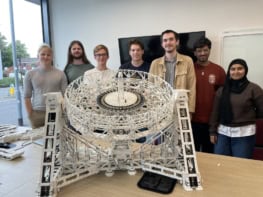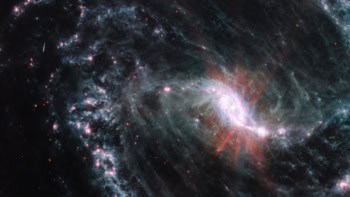Emma Chapman reviews First Dawn: From the Big Bang to Our Future in Space by Roberto Battiston (translated by Bonnie McClellan-Broussard)

I’m going to admit something embarrassing. When I initially came across First Dawn, I literally judged the book by its cover and title. I sat down expecting to read about my research area: the era of the first stars in our universe. Just a few pages in, however, it dawned on me that this book would not allow me the luxury of basking in what I already knew. I was to be reminded instead of how much I did not know, and the smallness of my academic comfort zone.
So what exactly is this book about? Everything and nothing. Or rather, how little we know about an awful lot. Instead of focusing on what we know about one topic within astronomy, Roberto Battiston joyfully discusses how far we have come and how far we have left to go on subjects “From the Big Bang to Our Future in Space”, as the subtitle reads.
Battiston, a physicist and former head of the Italian Space Agency, is a hugely likeable narrator. Reading about the ignorance of humanity on subject after subject could easily be discouraging, but you get the sense that the author positively revels in the unknown. It rather feels like running to keep up with a tour guide with an umbrella, who is gleefully pointing out one sight after another. In one memorable insight, Battiston describes the hours he spent in the CERN libraries before the World Wide Web was invented. “I remember… sitting on the floor, surrounded by books, one open on top of another, in order to compare texts and references in real time. It was like having an analogue computer with a lot of open windows and being able to jump from one PDF to another.” Then, you had to work hard to find information, whereas now there is arguably too much knowledge at our fingertips. We find it hard to dedicate ourselves to any one topic, or question, or tab.
For me, the major trauma of working at home is seeing people’s shared screen with a browser full of dozens of open tabs – it makes me anxious just looking at it. I cannot handle half-considered content, a task undone or an unexplored tab with a potential answer to a question. So First Dawn was a welcome challenge for me, because it is a book that explores outstanding questions on topics as diverse as inflation and interstellar migration – opening new windows with abandon.
I often felt a little breathless and stunned at the end of a quick dip into a complex field but, as the author points out, there’s no shame in this
Divided into 33 short chapters, each one is a round-up of why a topic is interesting, how our knowledge has progressed, and where astronomers are concentrating their focus next. The pace of the book reflects the pace of knowledge evolution that Battiston wants to highlight. In fact, I often felt a little breathless and stunned at the end of a quick dip into a complex field but, as the author points out, there’s no shame in this. While full of short introductions to various scientific concepts and areas, this is not an “intro to” book; and it is possible that readers will lose out if they do not have some prior passion for the field. In short, it is a gift for the scientist in your life, or that friend who watches Brian Cox documentaries, but maybe not your neighbour who has never looked up in wonder.
The last few chapters, where Battiston discusses antimatter (his research speciality) and the future of space travel, are particularly fascinating. You can hear his passion, and you get details and anecdotes that you just wouldn’t be able to find using a search engine, with his role as a space agency head granting him a unique view. He describes his visits to the factories of SpaceX, for example, refers to Elon Musk on a first-name basis, and discusses the political geography of research funding in an era of space billionaires.
Even if you have only a few spare minutes at a time to read this book, you will glide through chapters. You’ll be reminded about what a fermion is, make a note to look up more about the Higgs boson, and excitedly learn about space-based experiments to find dark matter. You’ll end up with a lot of open tabs in your brain, so do not expect to come away feeling satisfied with answers. Instead, you’ll understand the urgent need to ask that next big question: Can we travel at near-light speeds? Is there life on other planets?
In his preface, Battiston writes that he has always been “intrigued by edges, attracted by the discontinuity that exists between the frontier and the abyss, between the new and the old, between knowledge and ignorance; this is why I chose to become a scientist, and I have never regretted it”. I do not regret misunderstanding the content of this book when I first picked it up. It challenged me in areas where I knew nothing and humbled me in areas where I thought I knew everything. Prepare to be dizzied and ask Santa for some page markers – you’ll need them.
- 2022 MIT Press 216 pp £25hb



